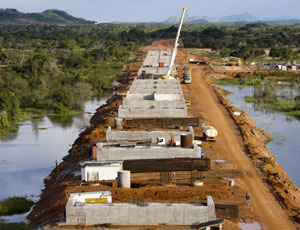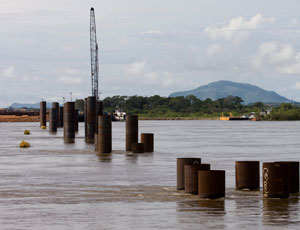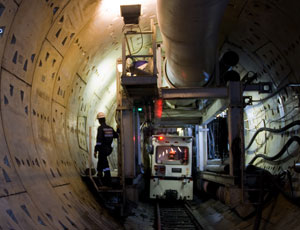As Venezuela’s government has undertaken the difficult task of recasting its budget to handle the new economic pressures — notably the precipitous fall in oil prices — construction interests are watching the developments with concern.
In a nationally-televised announcement last Saturday, Venezuelan president Hugo Chavez unveiled a new initiative of austerity measures and tax hikes to meet the country’s growing budget shortfall. More than 90 percent of Venezuela’s export revenue comes from oil whose prices have plummeted more than 50% in the past nine months.



The country’s original budget for 2009 was based on an annual estimated oil price of about $60 per barrel but, as of this week, the average price for the year was less than $37. The new budget is based on a $40-per-barrel price over the course of 2009, Chavez said in his address.
The scarcity of cash has forced Venezuela to hold up payments to companies contracted by the government for various projects including construction efforts.
Petroleos de Venezuela SA, the country’s state-run oil company, owes $7.86 billion in back payments to oil service companies and suppliers, according to its most recent earning statements. Several of this companies including Ensco International Inc. of Dallas, Texas, have idled their operations as a result.
In the past several weeks, Venezuelan media have reported several government-funded construction efforts have been subject to work stoppages as well.
Officials with Odebrecht Venezuela, said they may have to alter the pace of their work but have no intention of stopping any of their projects they are working on in the country.
“We do not intend to slow down our efforts and if the customer makes any reduction of resources, we review the deadlines for completion,” said José Cláudio Daltro, head of administration and finance for Odebrect Venezuela. “We have had no problems with billing or reimbursements of work we do not expect our works to be subject to nationalization.”
One of the major projects undertaken the division of the Brazilian construction giant is the Orinoco River Bridge connecting the cities of cities of Cabruta and Caicora del Orinoco. With the last of three spans being built over the river, the $991-million project is slated for completion in 2011. In addition, the company is also working on two new lines for the Caracas metro as well as Line 2 of the Los Teque metro.
Last year, Venezuela slapped the firm with a $282-million bill for back taxes it claims have not been paid. The company disputed the claim but promised to work with the government to resolve the dispute.
A more pressing problem for the government is finding the cash to pay the $10-billion-plus bill for recent nationalizations that has yet to be paid. Over the past two years, Chavez has undertaken an aggressive nationalization campaign that has included takeovers of energy, telecoms, steel and cement companies. Only a handful have been compensated for the loss of their assets. One of the main groups still out in the cold are cement manufacturers.
In April of last year, Chavez nationalized the country’s cement industry saying he was stopping private companies from exporting the commodity when it was needed to address the domestic housing shortage.
Two of the largest companies Lafarge of France and Switzerland's Holcim agreed to sell to the government but Mexico’s Cemex, who held almost half the market, balked saying the price Venezuela was offering was too low. Chavez sent the military to seize Cemex’s operations.
Since then, efforts between the Monterrey-based cement firm and Venezuelan officials have floundered and efforts by Lafarge and Holcim to obtain their payments have been unsuccessful as well.
Last week officials with Holcim announced they would be seeking assistance Washington-based International Center for Settlement of Investment Disputes to recoup the $552 million Venezuela had agreed to pay for the Swiss company’s assets. Lafarge has not been paid the $267 million it is owed for its former holdings in Venezuela either.
Despite the changes to economic policy unveiled by Chavez last week, the government balked on two key moves many observers believe are necessary to avert an economic crisis — devaluating the country’s currency and raise gasoline prices.
Venezuela’s currency, the bolivar, is set at an official rate of 2.15 per dollar although it trades at as much as three times that on the black market. The government also sets the price of gas at 17 cents a gallon — one of lowest prices in the world — effectively subsidizing the difference in the actual price.
The new budget calls for raising the country’s minimum wage 20 percent to keep abreast of rising inflation and includes increasing government financing from $5.6 billion to $16 billion.
Still, Chavez has already turned to one of his most common strategies for combating criticism of his administration in the past — publically blast the president of the United States. The fiery leader’s colorful criticisms of former president George Bush for many of the problems in the hemisphere were a mainstay of his weekly radio show. Chavez returned to that tack this week labeling new US President Barack Obama “ignorant” concerning Latin America.


Post a comment to this article
Report Abusive Comment